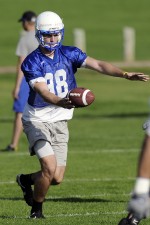 This is an interview Craig did on making winning a habit with Dr. Allen Fox who has a Ph.D. in psychology from UCLA, where he won the NCAA Singles and Doubles titles and was named UCLA Athlete of the Year.
This is an interview Craig did on making winning a habit with Dr. Allen Fox who has a Ph.D. in psychology from UCLA, where he won the NCAA Singles and Doubles titles and was named UCLA Athlete of the Year.
He played professionally coached the Pepperdine University tennis team into a national power and wrote 4 books including “Tennis: Winning the Mental Match.”
In Sports competitions, Dr. Fox explains how WINNING needs to be a habit!
Craig, the Mental Toughness Trainer asks Dr. Fox, “What would you have to say to a sixteen year old having a meltdown? You can see it in his body language.”
 Well… first in almost any psychological issue, the first step is to understand what’s happening. Okay? And most kids or adults or whoever, they will repeat a mistake over and over again, because they don’t really recognize what’s happening.
Well… first in almost any psychological issue, the first step is to understand what’s happening. Okay? And most kids or adults or whoever, they will repeat a mistake over and over again, because they don’t really recognize what’s happening.
So first, they have to understand the dynamics. It’s really somewhat simple. The dynamic is all sports are basically habit formation and then emotional control.
You would explain…what you’re doing in practice is learning habits. When you actually get into competition, you can’t think your way through the shot. You can’t fake your way through shooting the basketball through the hoop or hitting the home run. It’s a reflex but a habit, based on your years of practice in those situations. You see the ball, you swing and you don’t think as you do it. You just do it.
 Let’s discuss habit formation as the essence of practice. Athletes need to understand their whole objective in practice is repetitions of the habit they want to come out in competition. So if you want to hit your backhand well in tennis, just hit 10 million backhands properly in practice.
Let’s discuss habit formation as the essence of practice. Athletes need to understand their whole objective in practice is repetitions of the habit they want to come out in competition. So if you want to hit your backhand well in tennis, just hit 10 million backhands properly in practice.
Practice should be an active process. You don’t just go out and hit balls. The people that get very, very good, as they’re hitting, their brain is working trying to make the stroke as perfect as they can. So they are adjusting, they are noticing how the stroke is working so forth so they can perfect it.
And there’s always something that you can do to make it a little better. It takes thought. You don’t just go out and hit balls. So that and the numbers of repetitions. The more repetitions, the better you get. Like playing the piano. You play the piece a thousand times then you’re better than if you play it five hundred. So there’s a simple one-to-one correlation.
Now… when you get into competition then it becomes emotion. You need to let the habits come out – you can’t force these habits to come out. Let’s just use tennis as an example. You see a situation the ball is coming and the opponent is over on one side of the court, you’re going to hit to the opening or maybe hit behind them.
 You’re going to do what your habits lead you to do. It’s a quick and instinctive reaction. And so to make the habit come out properly or as best as you can, you have to be in a good emotional state. If you’re negative, if you’re down, if you’re feeling depressed or dejected because you’re behind, your reaction is going to come out poorly.
You’re going to do what your habits lead you to do. It’s a quick and instinctive reaction. And so to make the habit come out properly or as best as you can, you have to be in a good emotional state. If you’re negative, if you’re down, if you’re feeling depressed or dejected because you’re behind, your reaction is going to come out poorly.
So the way the young player needs to look at it, that it’s a part of their job as a competitor to set up an emotional stage, so that the proper habit will come out rather than some habit that’s going to cost them the point. Of course, there’s more to both of them, but those are the essence of it. If they ever understand that, it gives them a fighting chance to correct. If they don’t, then they’re just going to let nature take its course.
To purchase any of his amazing books on the mental game go to his website AllenFoxTennis.net
